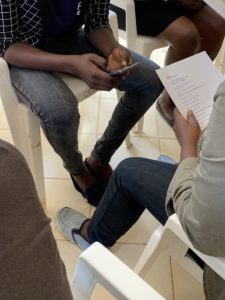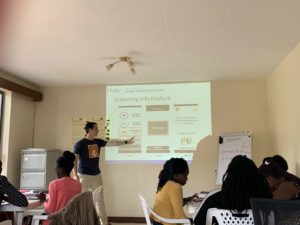 In order to ensure participants had a strong understanding of mSaada and the planned pilot usability study, members of the mSaada study team hosted a two-day training, June 6th and 7th, at the Kisumu Office of the Center for Global Reproductive Health. Twelve study participants, four researchers, and two research assistants were in attendance.
In order to ensure participants had a strong understanding of mSaada and the planned pilot usability study, members of the mSaada study team hosted a two-day training, June 6th and 7th, at the Kisumu Office of the Center for Global Reproductive Health. Twelve study participants, four researchers, and two research assistants were in attendance.
The first day of the training began with a general overview of research, its importance, those involved, and a lengthy discussion of informed consent. After a tea break, we proceeded with a discussion of HPV and cervical cancer, and prevention, screening, and treatment strategies. In addition to lively audience participation during a session of review questions, each study participant displayed their understanding of the steps necessary to successfully complete HPV self-collection by demonstrating how to explain the process to a female client. Finally, the first day of training concluded with a 2-hour session on mhealth strategies and details of the planned mSaada pilot usability study.
Day two of the mSaada training focused entirely on familiarizing the study participants with the mSaada platform. As a group,  with study phones in hand, we walked the participants through login/logout procedures and the four main features of the app: “Add New Patient”, “Search Patient”, “Screening Info”, and “Questions”. As we progressed through the app and its features, study participants were not shy about asking for clarification and providing initial feedback, which was greatly appreciated. In addition to an electronic walkthrough of the app, day two of the training included a hardcopy explanation of all of the material within mSaada, to help acquaint participants with the breadth of information at their fingertips. Finally, the afternoon of day two was spent having study participants role-play as clients and providers to gain practice with mSaada. For the role-play exercise, we moved tables aside and arranged chairs into two rows of six in the center of the room, turning the chairs so the participants faced one another. Six participants were given example scripts, allowing them to function as possible clients, and six participants used mSaada to guide these “clients” through counseling, education, and screening. As participants rotated through the prepared scripts, they were confronted with different “clients” that forced them to use various aspects of the app.
with study phones in hand, we walked the participants through login/logout procedures and the four main features of the app: “Add New Patient”, “Search Patient”, “Screening Info”, and “Questions”. As we progressed through the app and its features, study participants were not shy about asking for clarification and providing initial feedback, which was greatly appreciated. In addition to an electronic walkthrough of the app, day two of the training included a hardcopy explanation of all of the material within mSaada, to help acquaint participants with the breadth of information at their fingertips. Finally, the afternoon of day two was spent having study participants role-play as clients and providers to gain practice with mSaada. For the role-play exercise, we moved tables aside and arranged chairs into two rows of six in the center of the room, turning the chairs so the participants faced one another. Six participants were given example scripts, allowing them to function as possible clients, and six participants used mSaada to guide these “clients” through counseling, education, and screening. As participants rotated through the prepared scripts, they were confronted with different “clients” that forced them to use various aspects of the app.
After successful completion of the two-day training, participants were sent home with folders filled with information we discussed. In the coming weeks, participants will be provided with a detailed user manual for reference during the study period.
